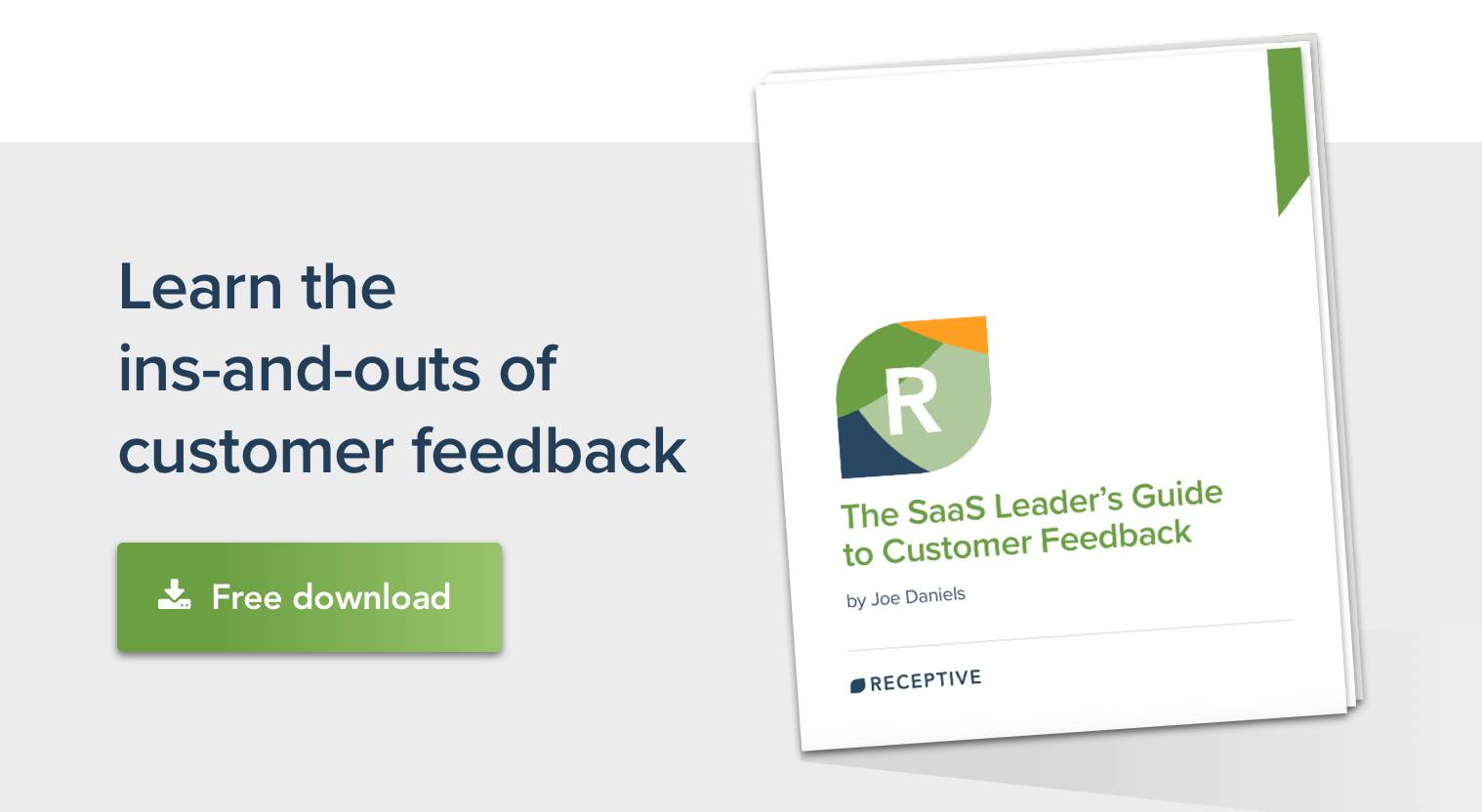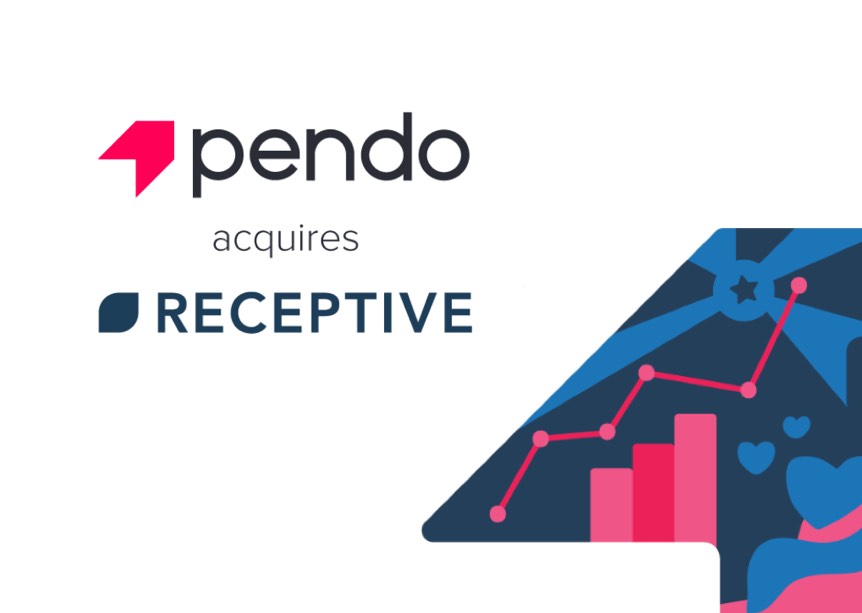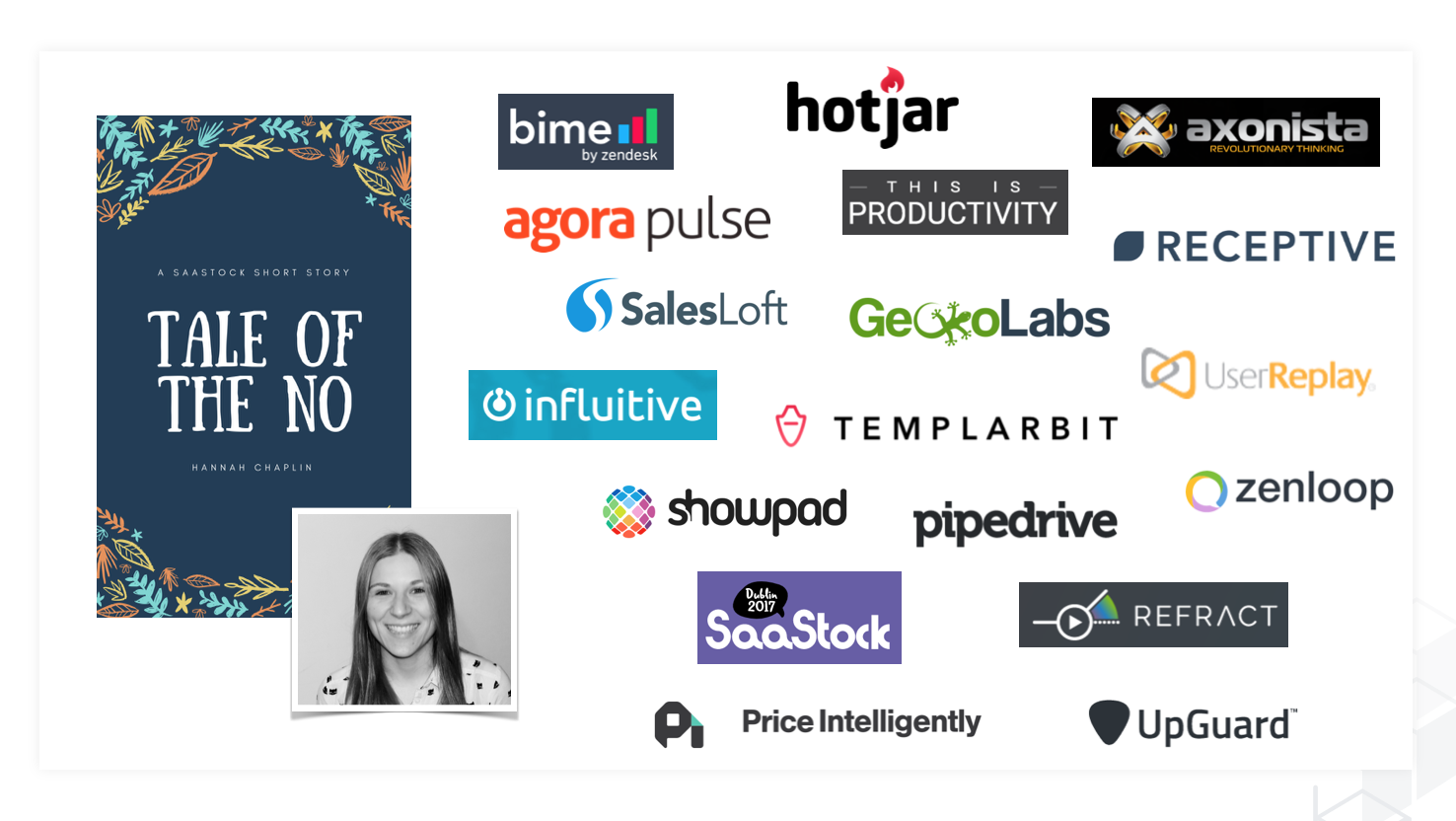
SaaStock 2017
SaaStock was an incredible event this year and I was fortunate enough to be speaking at the event. As part of the At Scale series, this presentation is the result of interviews with other SaaS CEOs/founders about the tricky art of saying “no”…
Thank you again to everyone who gave their time to be involved in this. Legends.
If you’d like to sign-up for the At Scale content, just go here.
Here’s the transcript & video from the actual presentation:
Tale of “The No”
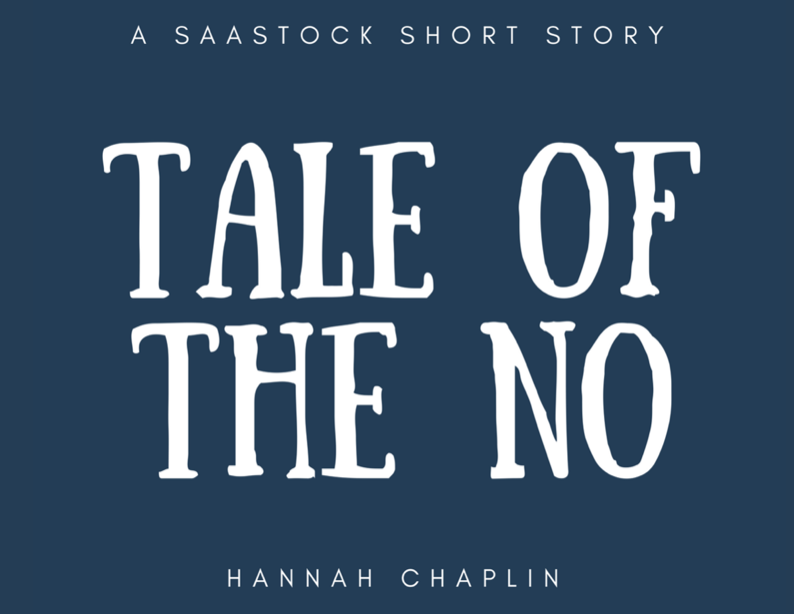 Thanks to Carrie at Receptive
Thanks to Carrie at Receptive
Hello, I’m Hannah Chaplin CEO & co-founder at Receptive.
First off, thank you for having me. It’s an absolute pleasure to be here and I’d like to congratulate Alex and the team.
So…when Alex asked me to talk about what we’ve learned from gaining traction and scaling a business, the idea of saying “no” immediately sprang to mind….not “no” to speaking…but saying “no” to the sheer volume of things you get asked to do and that you could do as you start a business and then scale it up.
And to say “no” to things, you have to have a certain level of confidence about you and that’s incredibly hard when you’re just started out and really have no idea what you are doing.
So if there’s a lesson to share, it’s certainly this one…
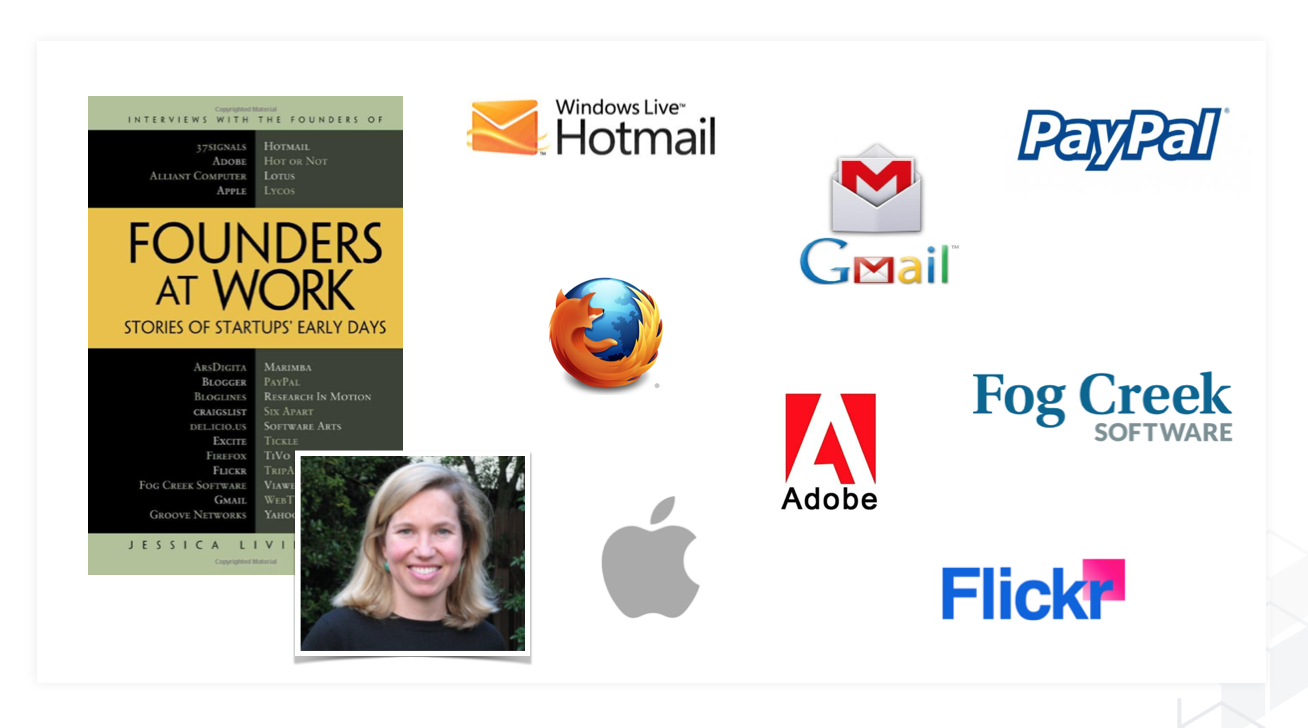 Has anyone read this book? Founders at Work?
Has anyone read this book? Founders at Work?
This was given to me many years ago (thank you Dan) and it was fascinating to read how every founder story is so different. It’s a brilliant collection of tales from founders about how they started their companies that was put together by Jessica Livingston who was a founding partner of y combinator.
 Thanks to Forest Service, Flickr
Thanks to Forest Service, Flickr
There’s a culture in some circles especially around technology businesses that can make you feel like you can’t be right if you don’t follow the herd — yet the stories I’ve encountered through discussion with other founders and CEOs and through books like Founders At Work, is that when you are starting out, gaining traction and scaling, every founder has a unique story — but one common thread that runs through them all is that you have to get incredible good at knowing what to focus on — or in other words you have to become incredibly good at learning what to say “no” to.
Rather than just telling my own tale I thought it would be really fun to do a mini, updated version of Founders at Work telling my Tale of the “no” alongside those of other founders.
Over the last few weeks, I’ve been lucky enough to connect with some wonderful people — all founders or CEOs of growing SaaS businesses, many of which are at the conference today (so hello and thank you again!) to hear what they have said “no” to as they’ve scaled.
I left it very open and simply asked…
What have you said “no” to as you’ve scaled your business?
 Thanks to Henry Burrows, Flickr
Thanks to Henry Burrows, Flickr
The responses were brilliant but what we most interesting was that they fell into 3 main categories which I’ll take you though in more detail now…
 Thanks to Thomas, Ville De Caudry, Flickr
Thanks to Thomas, Ville De Caudry, Flickr
The 3 categories were money, people — probably no surprises so far — and reality. Bear with me on the last one!
 Thanks to Giphy
Thanks to Giphy
Nearly everyone I spoke with has said “no” to money — very often from VCs but also from customers & potential acquirers too.
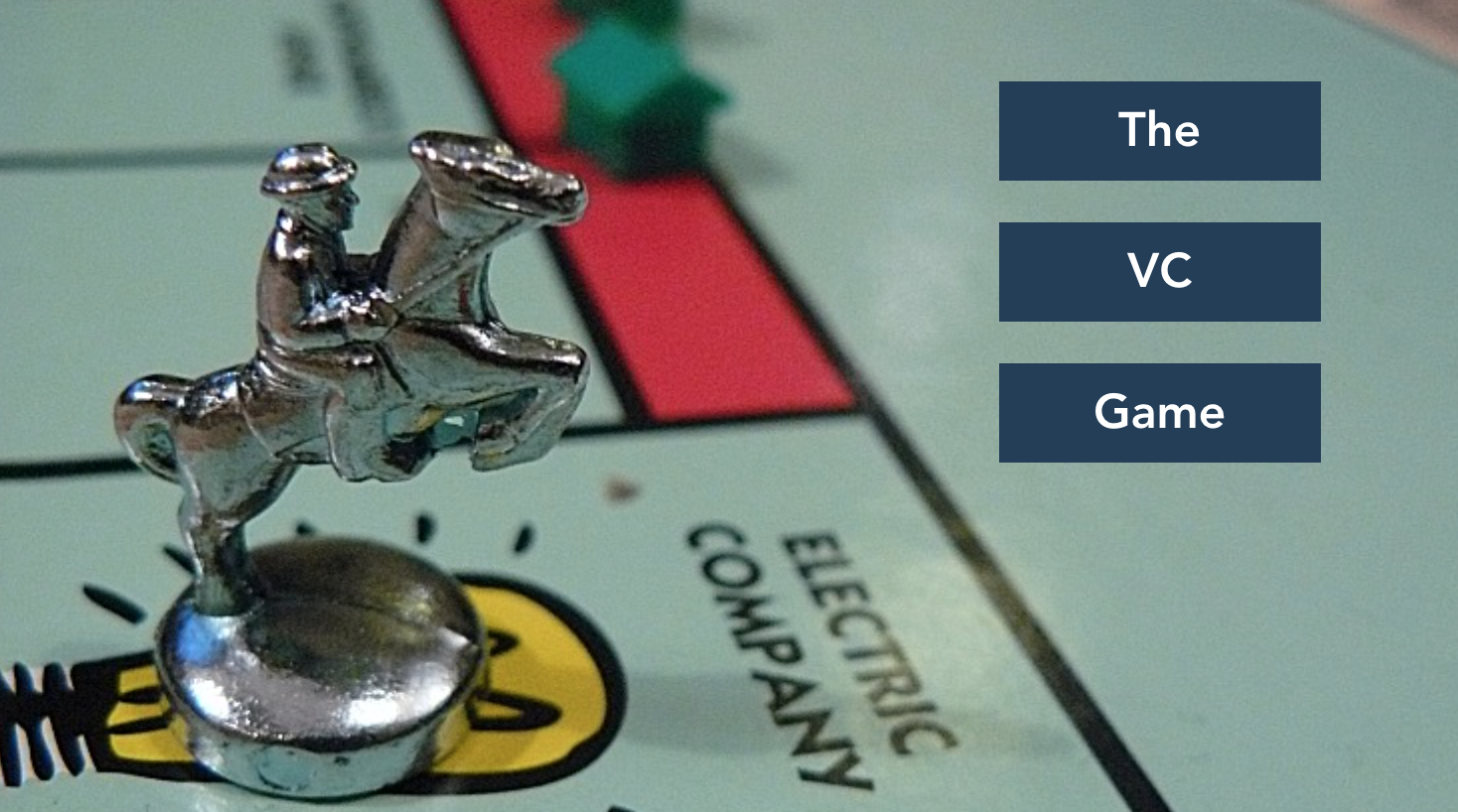 Thanks to Mike Fleming, Flickr
Thanks to Mike Fleming, Flickr
First up…The VC game.
When it comes to VCs, the biggest learning from founders here is that you don’t have to raise money if you don’t want to. It really is as simple as that. If you’re new to this, it can be presented as the only path or the most desirable path for a software start-up to take but there are so many ways to win.
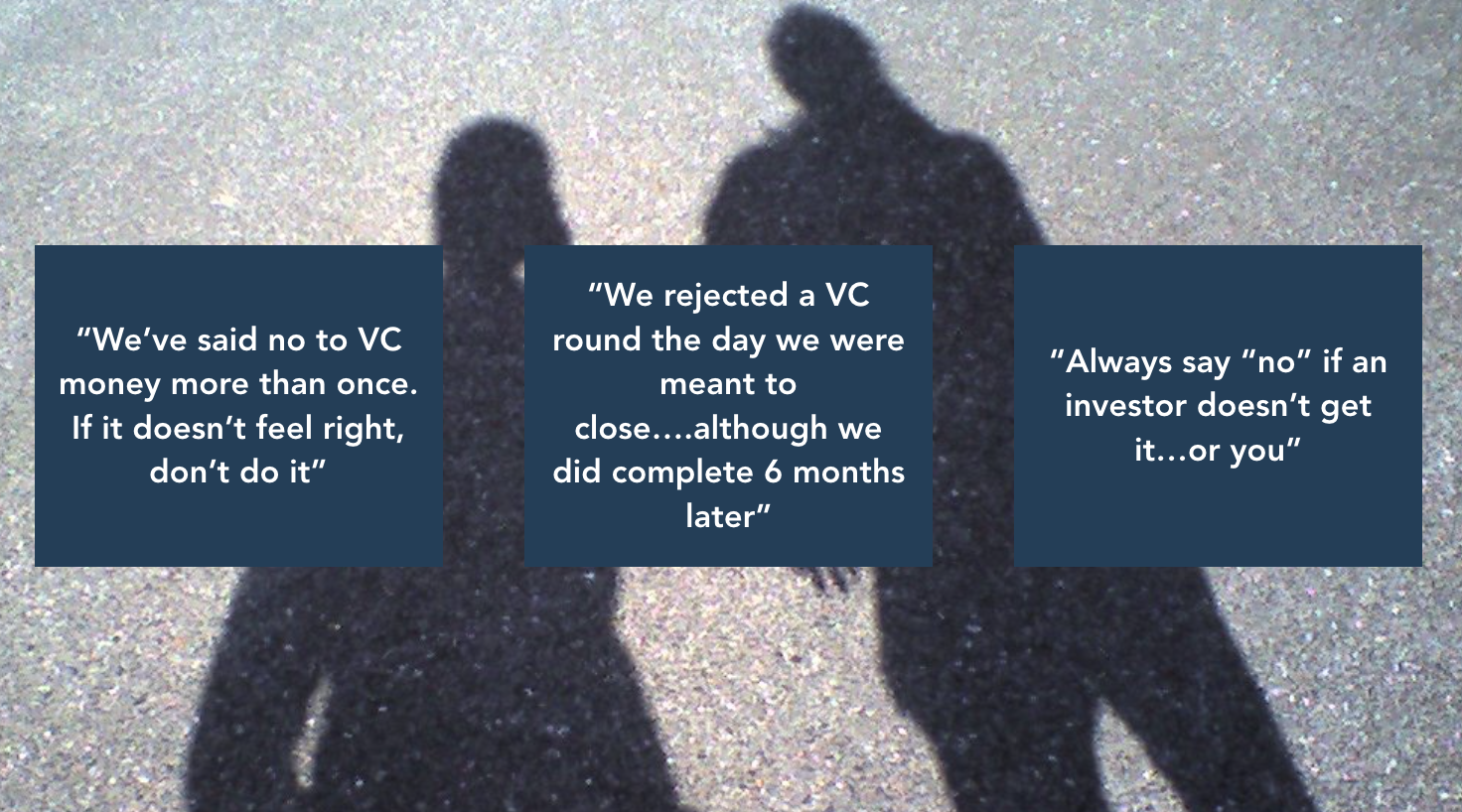 Thanks to Akira Ohgaki, Flickr
Thanks to Akira Ohgaki, Flickr
This isn’t an easy decision…it’s incredibly hard. Several founders I spoke with have turned down funding from great, top tier investors because their gut feeling was becoming VC funded was not the right move for the business at that particular time.
There’s a lot of rhetoric that tells you that you must be funded to scale but it’s not right for everyone and there’s a lot of good that can come from financial constraints which is why I love the next quote.
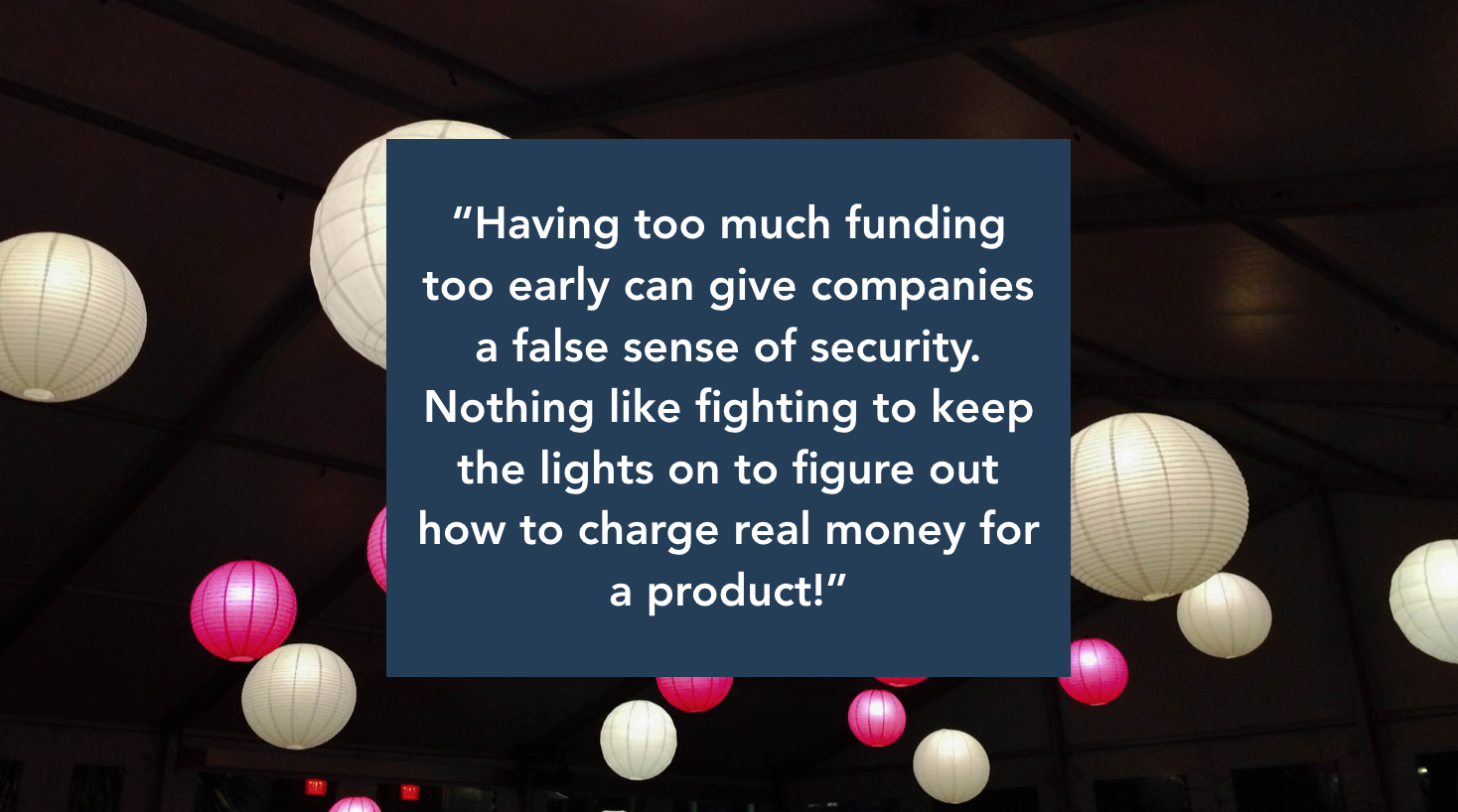 Thanks to Ashokboghani, Flickr
Thanks to Ashokboghani, Flickr
“Having too much funding too early can give companies a false sense of security. Nothing like fighting to keep the lights in to figure out how to charge really money for a product”
I loved it because it’s very true from my own experience. When you have constraints, you learn to be incredibly resourceful and creative which is a great skill to have as a founder. Personally, each time I’ve started a business those financial constraints have given me great focus and desensitised me to risk in a lot of ways too.
This absolutely is not anti-VC…sometimes it’s absolutely the right thing for a business. The lesson here is…
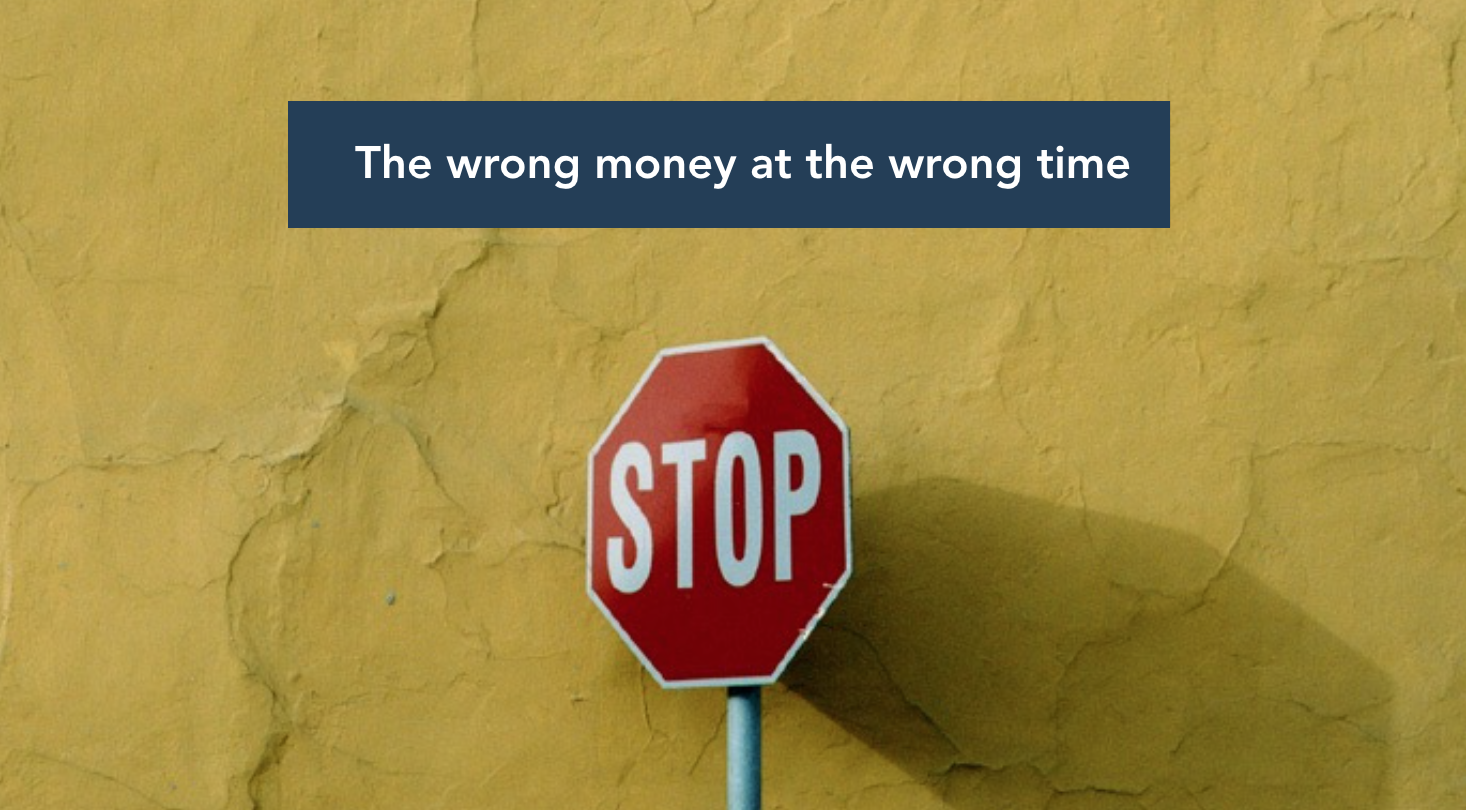 Thanks to Astarothcy, Flickr
Thanks to Astarothcy, Flickr
…that you shouldn’t be afraid to say “no” to the wrong money at the wrong time. And that might be VC funding, angel or regional funding…anything at all.
And remember that not having all the cash in the world can be a huge advantage so don’t be disheartened if you feel like you should be VC funded or have raised more money just yet.
Having said all this about VC funding, customer cash is not always good either. Just to confuse you all…giving you a taste of founder life…
 Thanks to Helge Thomas, Flickr
Thanks to Helge Thomas, Flickr
Sometimes rejecting a sale is the right thing to do. Where founders have had to do this, the one emotion that really shone through was just how painful this can be…
When you are starting out and badly need the cash flow, from the outside saying “no” to money from a potential customer sounds insane.
So why do founders do this? Let’s take a look at 3 great examples:
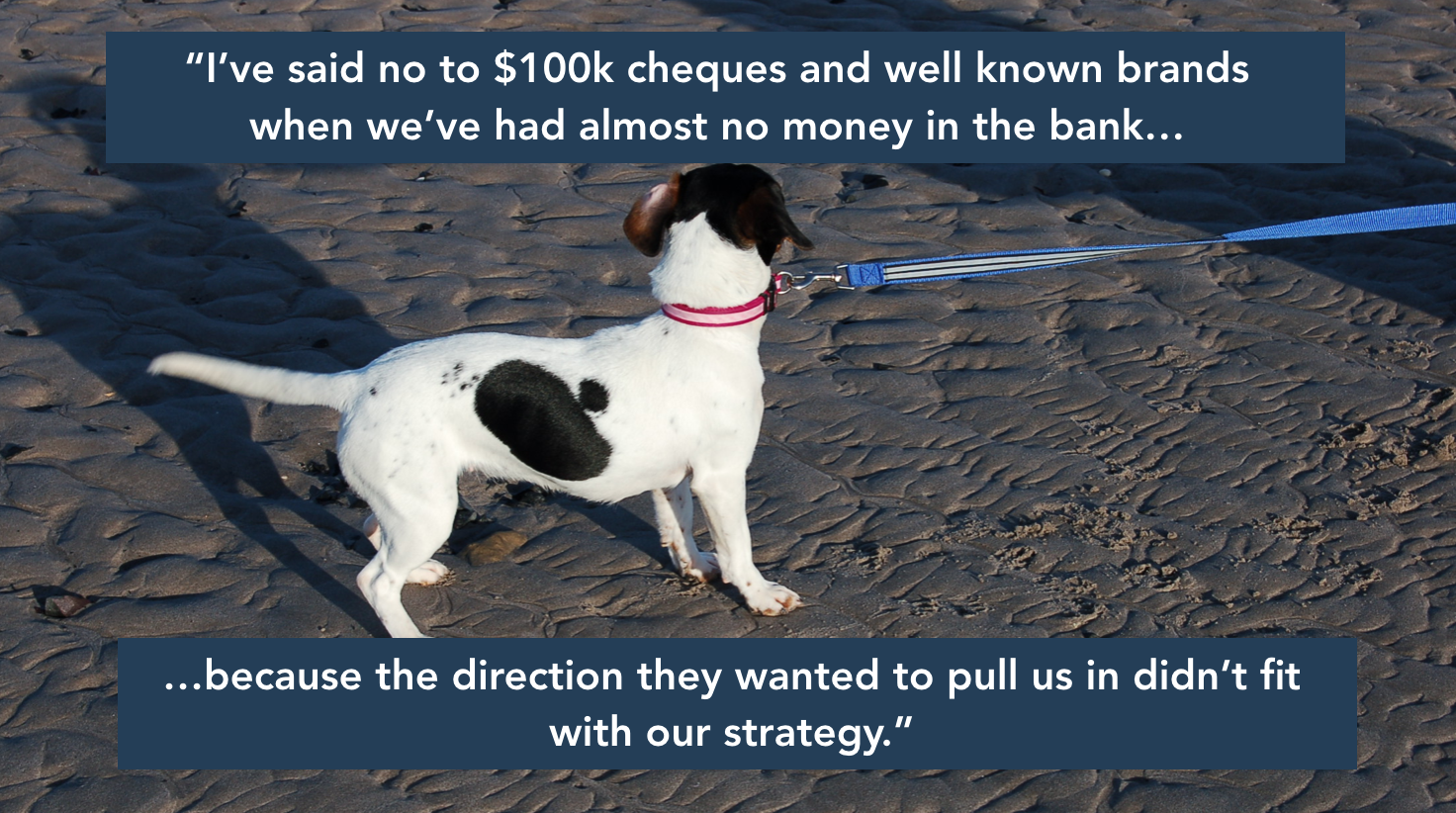 Thanks to Dean, Flickr
Thanks to Dean, Flickr
“I’ve said no to $100k cheques & well known brands when we’ve had almost no money in the bank…because the direction they wanted to pull us in didn’t fit with our strategy”
Strategy is the key word here and personally, I think it’s vital for every business regardless of your stage. **Strategy doesn’t mean that you have all the answers, it’s means you have a plan to get the answers you need to drive you business forwards. **
Without having a strategy, you have no reference point to make you decisions against and in the case of this founder, that strategy allowed the, to recognise when a customer could potentially lead them down the wrong path…even when there was a lot of money at stake.
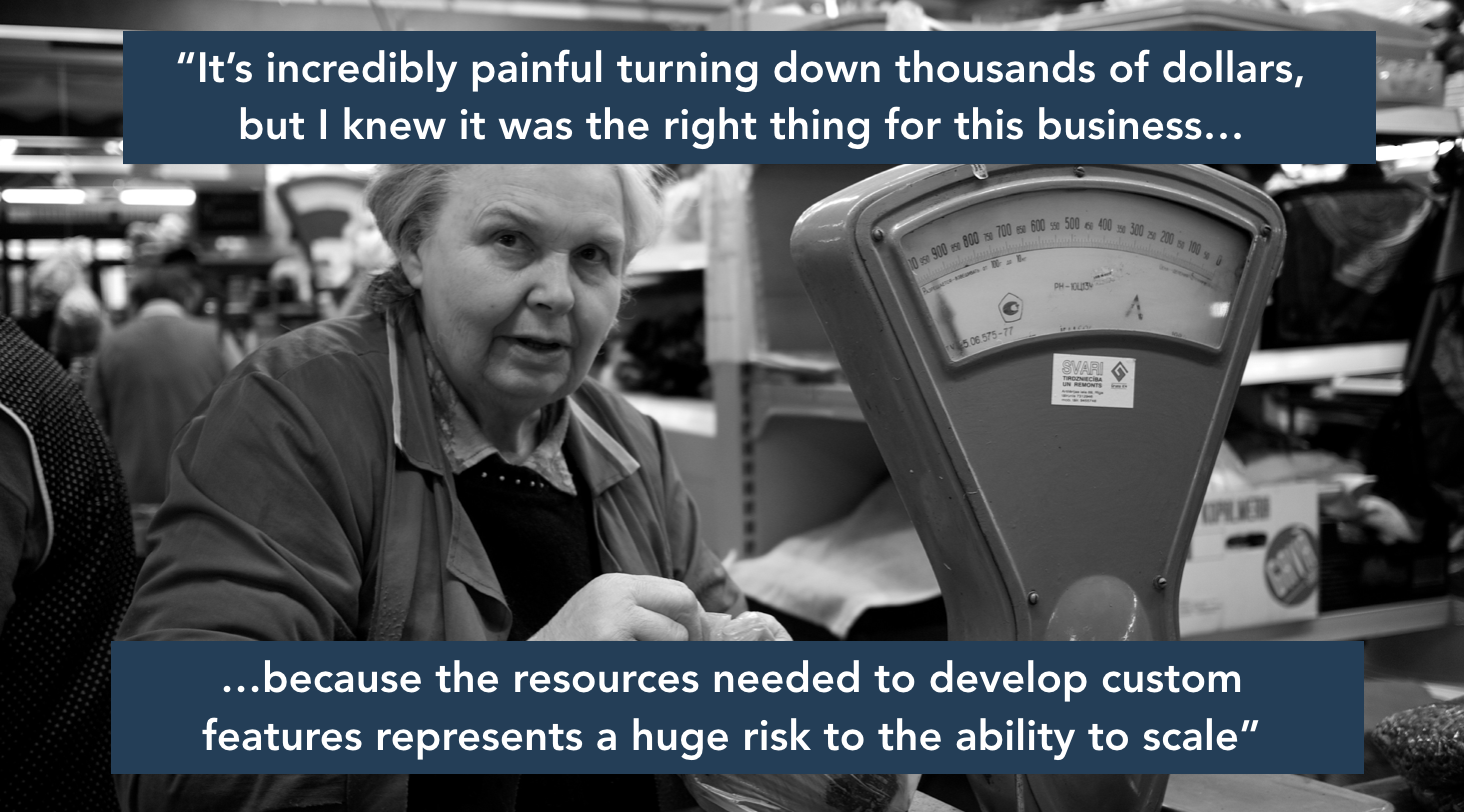 Thanks to Flickr
Thanks to Flickr
“It’s incredibly painful turning down thousands of dollars, but I knew it was the right thing for this business….because the resources needed to develop custom features represents a huge risk to the ability to scale”
This is HUGE. In fact recently, I’ve seen a promising company almost completely fail because they started building custom features which took up all the resources and energy and ultimately meant they weren’t investing in a scalable product.
You have to build the features which solve real problems for the majority and not the few. This comes back to strategy again — you have to know what you’re building, why you’re building it and who it’s for. Without that, you’ll be wasting your scarce resource building features that don’t really move the needle.
So again, great call from this founder.
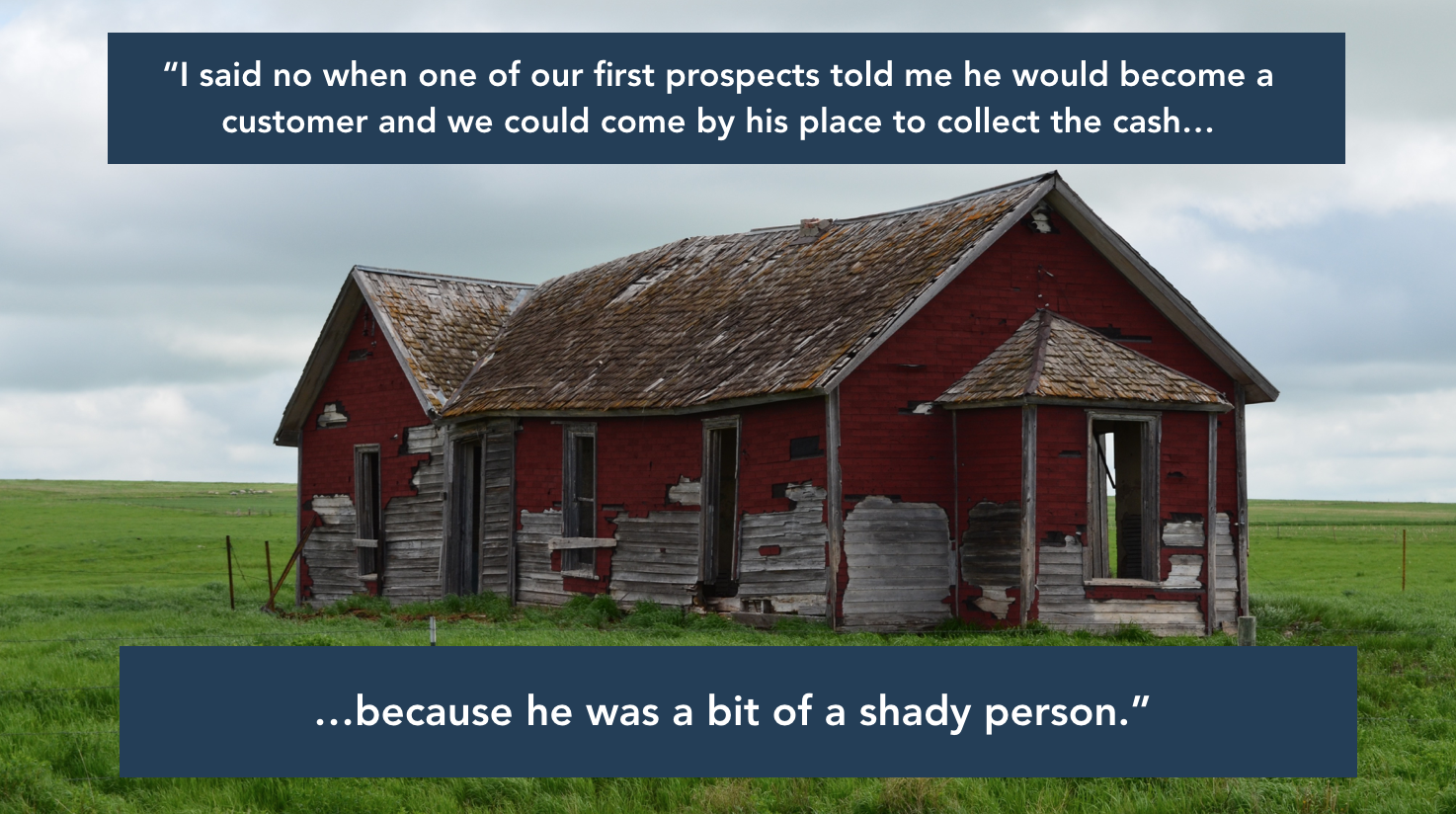 Thanks to James, Flickr
Thanks to James, Flickr
Finally, I love this one…
“I said no when one of our first prospects told me he would become a customer and we could go and come by his place to collect the cash…” Doesn’t seem anything wrong with that so far until…you learn he was a bit of a shady person”
This leads really nicely onto the next section about the importance of people. But first, quick recap on money…
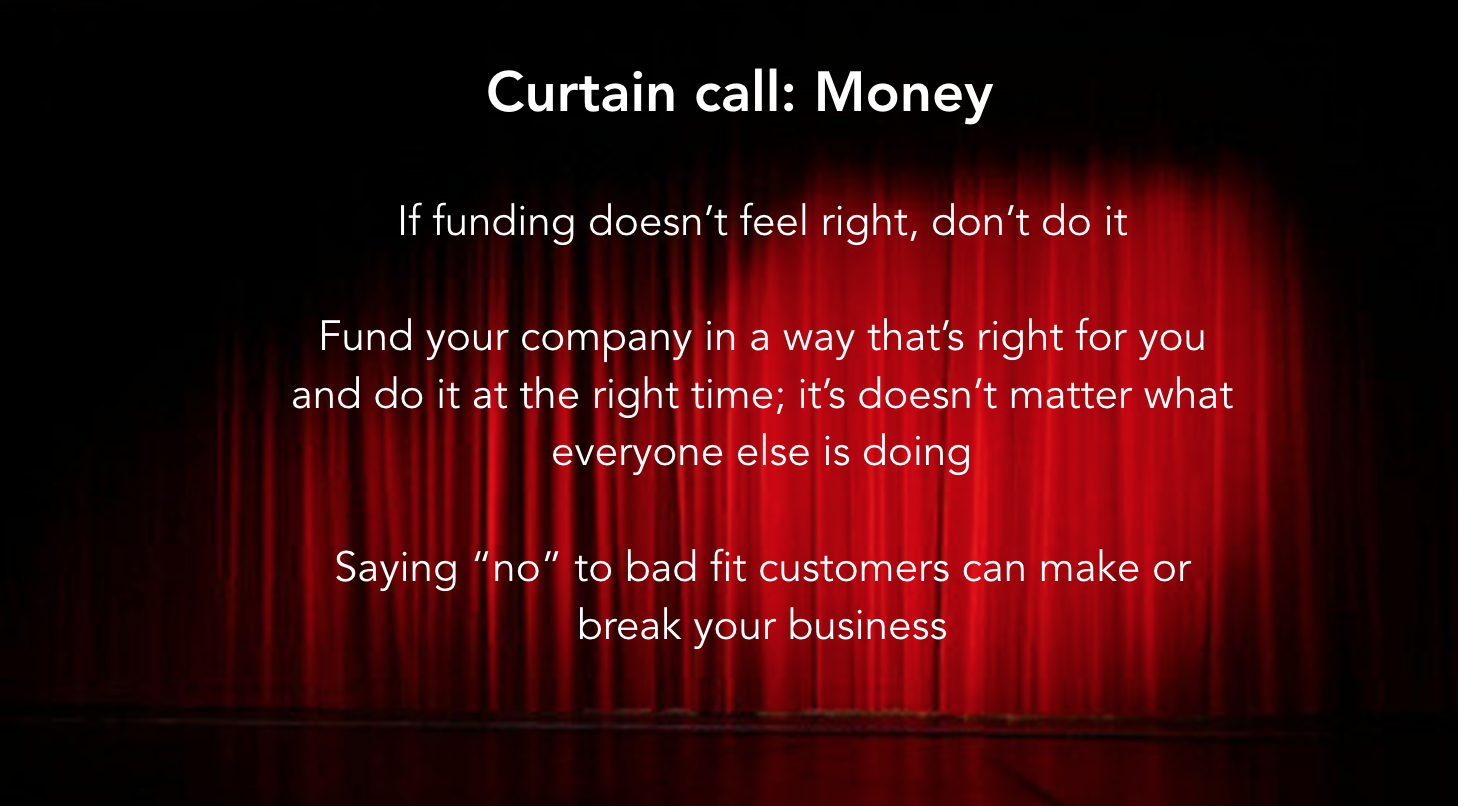
If funding doesn’t feel right, or it’s not a good time, then that’s OK! And remember that bad fit customers can make a massive difference to your growth.
 Thanks to Giphy
Thanks to Giphy
Next up…people
As I mentioned in the last slide about money, people can be really tricky and it was a hugely popular topic that I spoke with founders about especially when it came to hiring a team.
 Thanks to Kenny Louie, Flickr
Thanks to Kenny Louie, Flickr
A lot of other founders had the same experience as me which is that attitude really does win over experience. Even great people can be bad for business if they don’t bring the right attitude to work with them.
I could really relate to this quote about optimism in particular as it has tripped me up a few times and it can be a tricky lesson to learn, especially when you have so much to do…you can end up feeling like anyone will do so don’t give into the temptation to just fill a role because you have someone who will do or that you think will fit given time.
 Thanks to Eva Peris, Flickr
Thanks to Eva Peris, Flickr
These sentiments extend to your co-founders and invests too.
Sometimes, your best mates or the people closest to you aren’t the people that will be able to build and scale a company alongside you.
This quote is from a founder who clearly had to make some very personal decisions.
 Thanks to Gomagoti, Flickr
Thanks to Gomagoti, Flickr
Now…parties…every likes a party right…apart from me probably haha!
A lot of founders also find themselves saying “no” to parties, networking events and speaking engagements.
People like to hunt founders down and you get invited to all sorts of dinners and networking events which is lovely, it really is, but you have to get really good at guarding your own time to work on your business.
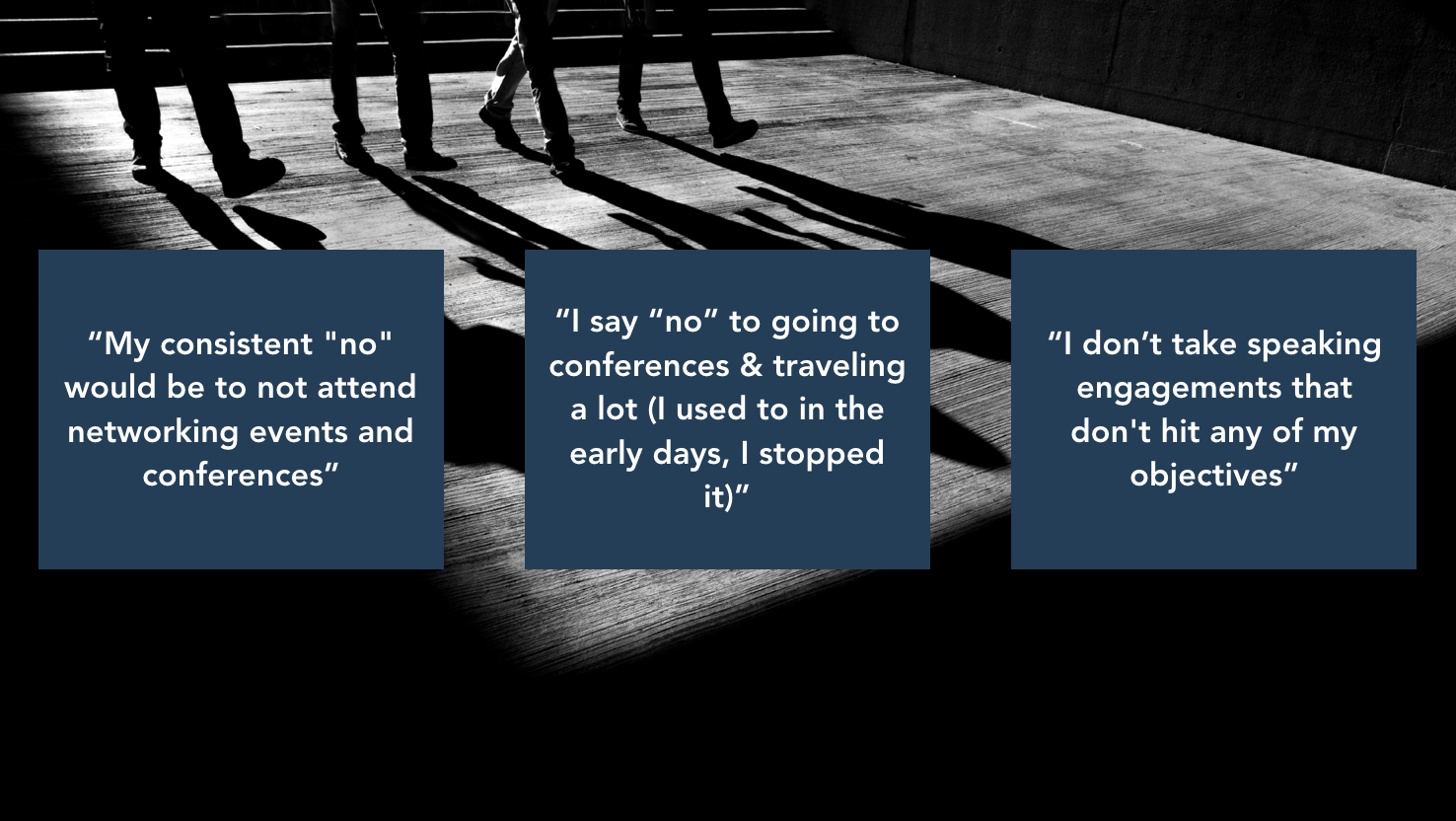 Thanks to Magdalena Roeselerm, Flickr
Thanks to Magdalena Roeselerm, Flickr
If it’s the right event then great, go for it, just don’t get sucked into the meetup culture and every invitation because things like that can be a huge distraction and give you the sense of being productive and busy when you’re not really moving the needle in terms of delighting your customers, building your team and creating a brilliant SaaS product.
My personal rule of thumb is that if you can help someone out, you should do it. It’s great to spend a few hours a week outside the bubble of your office helping others; I’m certainly forever indebted to folks who have done that for me.
So to summarize, when it comes to people…
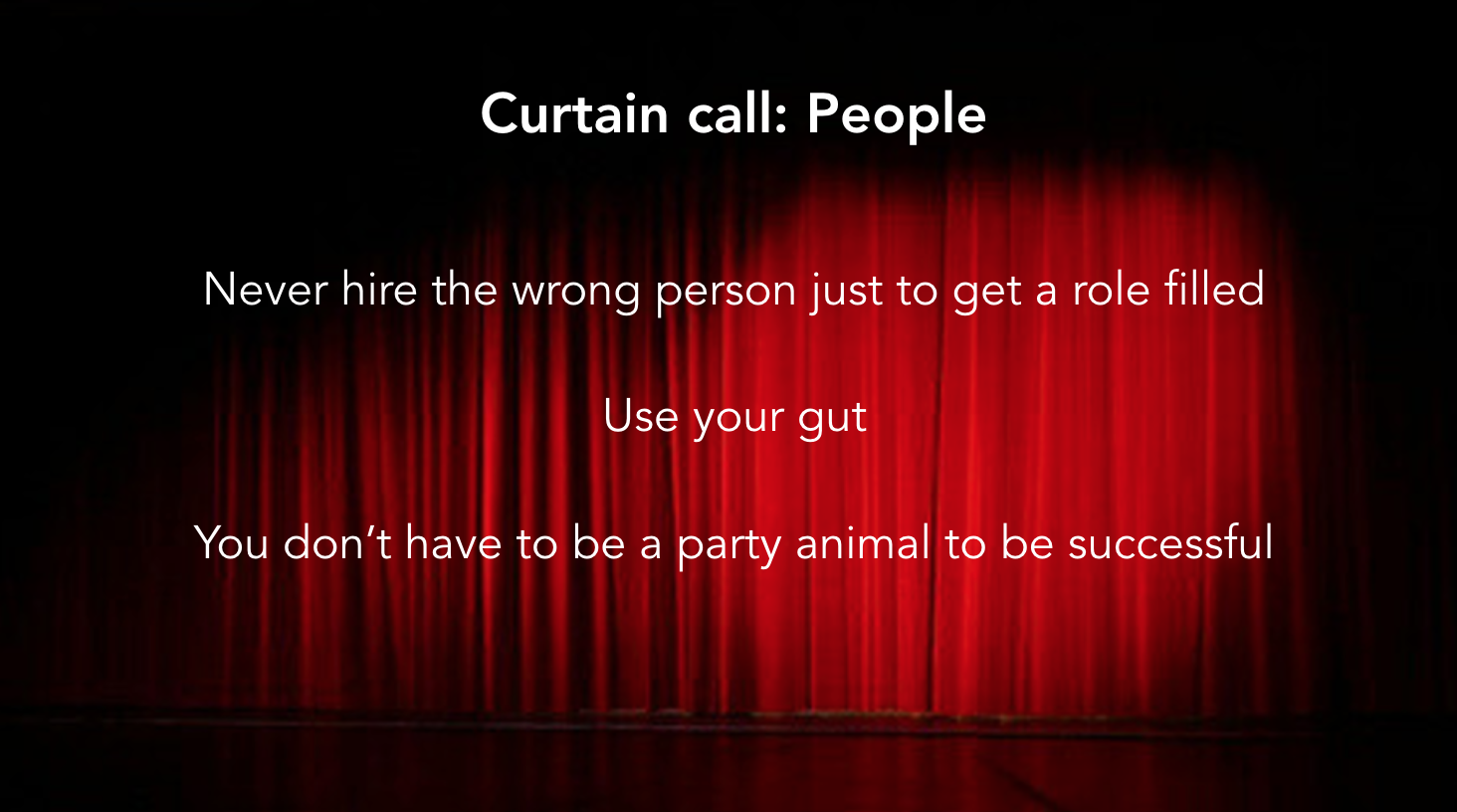 …never hire the wrong person just to get a role filled: Just don’t. It trips you up in the long run but can be a real temptation especially when hiring is initially a huge and time consuming task for the founding team.
…never hire the wrong person just to get a role filled: Just don’t. It trips you up in the long run but can be a real temptation especially when hiring is initially a huge and time consuming task for the founding team.
Use your gut: Sounds like terrible dating advice but I think in the early days when the team is small, you often instinctively know if someone is going to be a good fit for your team. Stay tuned into that and trust yourself.
You don’t have to be a party animal to be successful. Do help others and attend events that add value, but say “no” to getting sucked into the startup culture.
Last but not least, another very popular theme of “things to say no to” is reality..
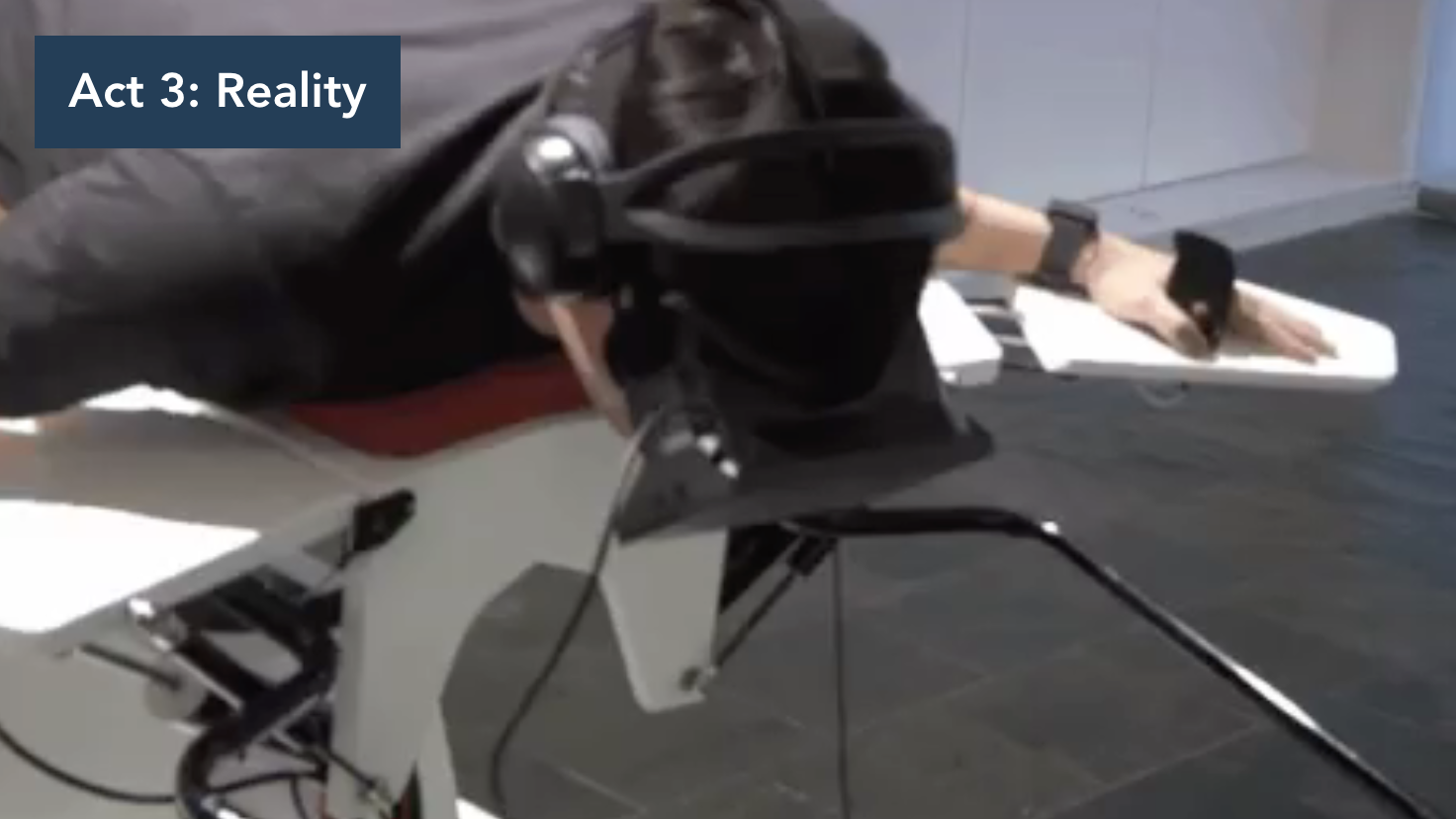 Thanks to Giphy
Thanks to Giphy
Sounds like a funny one but this third theme was very strong among founders because a lot of them have said “no” to a more “normal” way of life….having to forego things in their personal life or make tough decisions about even becoming a founder in the first place.
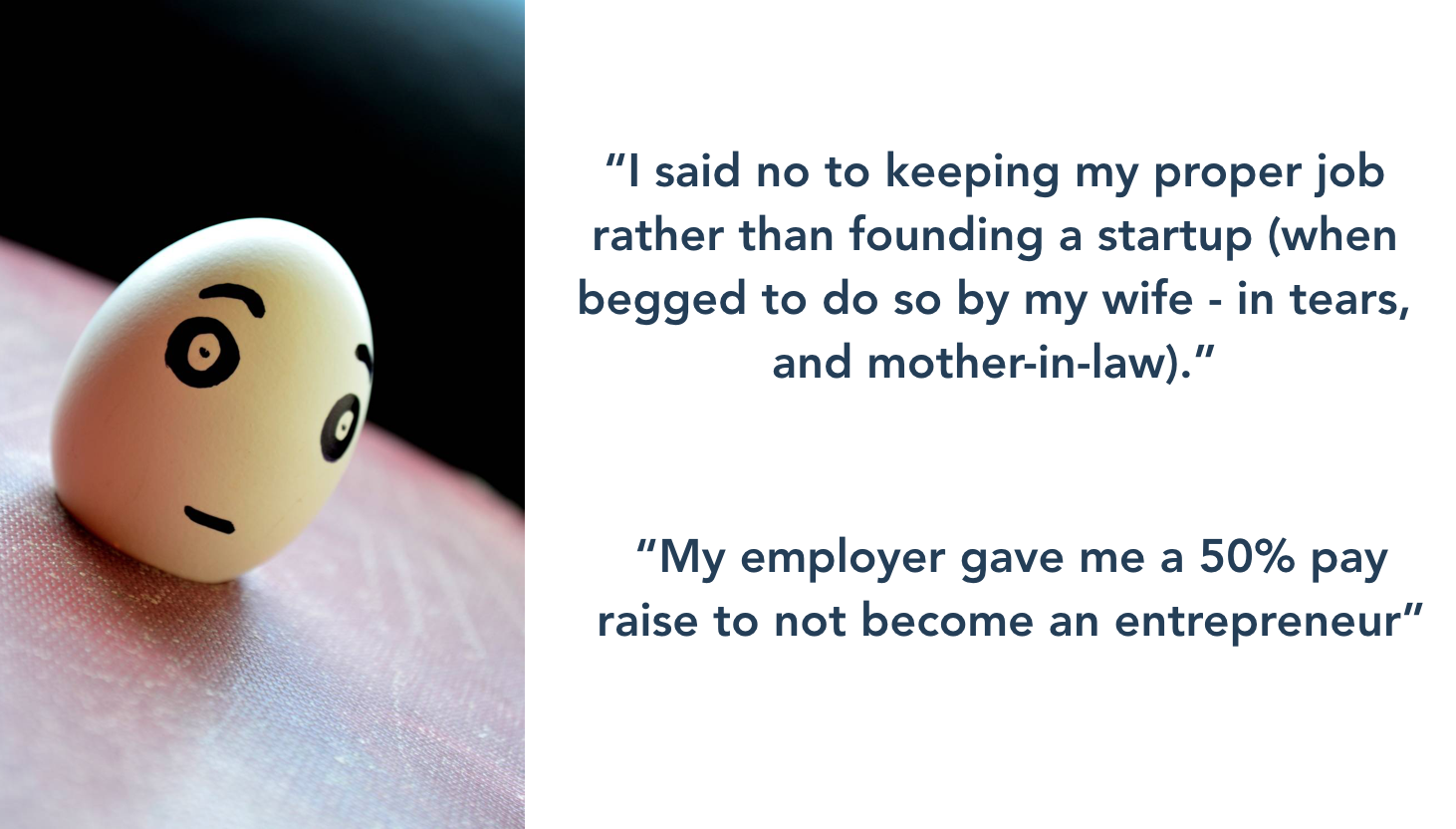 Thanks to Flickr
Thanks to Flickr
Here are a couple of great examples of founders who’ve said no to stable jobs which can be made even harder when the decision affects your family too.
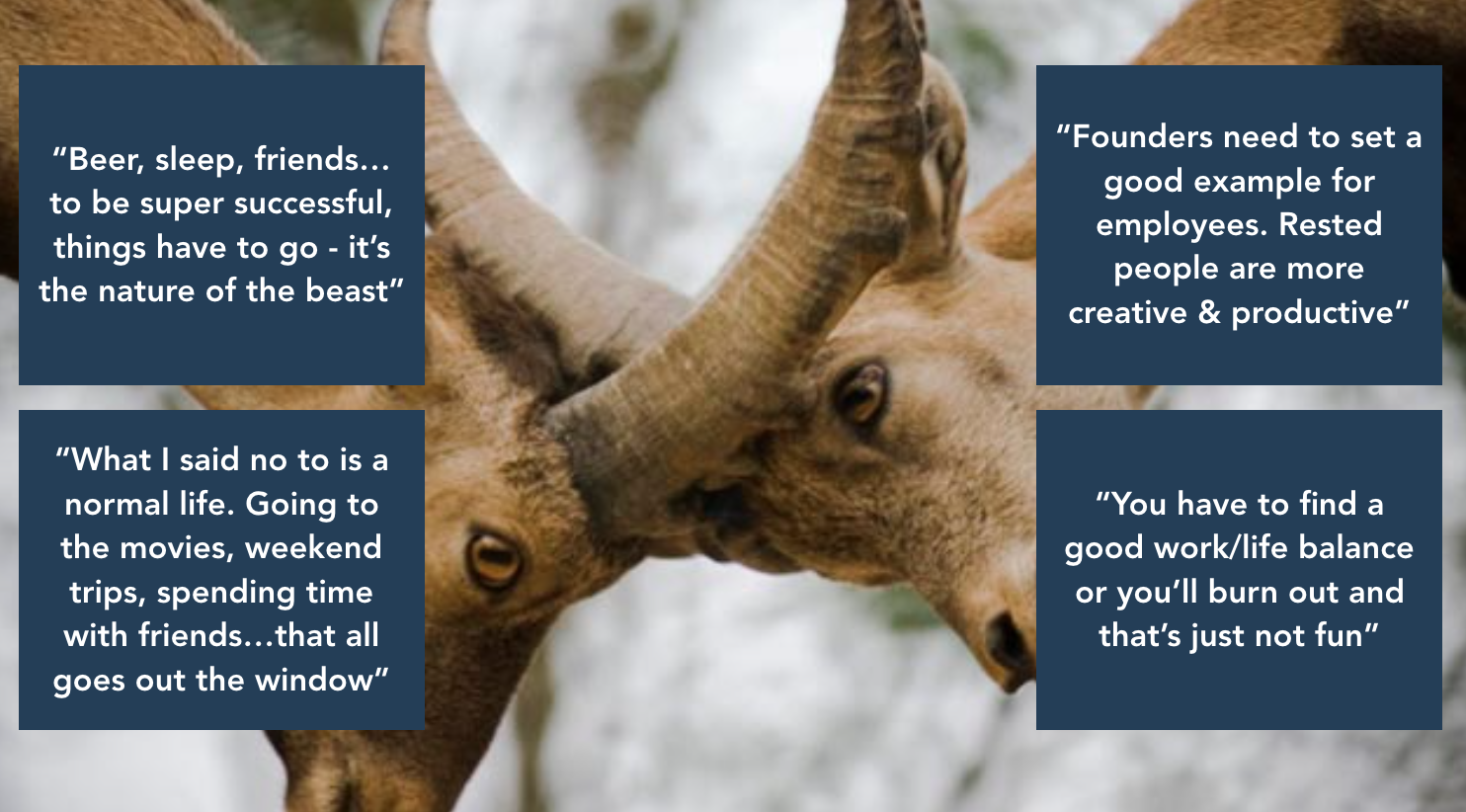 Thanks to Marlon Hammes, Flickr
Thanks to Marlon Hammes, Flickr
Reality & daily life, were actually the only area where I found some differences of opinion among founders — some said they gave up a balanced life; foregoing things like beer (very important that one!), sleep and friends. They felt that was simply the nature of beast…
…while others argued the opposite — being a founder involves a lot of hours but being rested and spending time with family and friends were frequently cited as being a huge factor in the success of the business.
Personally, balance is key and I try to set a good example for the team on that one…you have to find the balance and schedule the works for you — you need to come to work refreshed and ready to go but that balance right be different for everyone so create a culture that allows for that.
 Thanks to Jennifer Zhou, Flickr
Thanks to Jennifer Zhou, Flickr
And finally, I’d like to talk to you about the founder bubble.
Founders exist in a different reality to everyone else when it comes to their product which then affects the decisions you make — and those decisions can be about any aspect of your business.
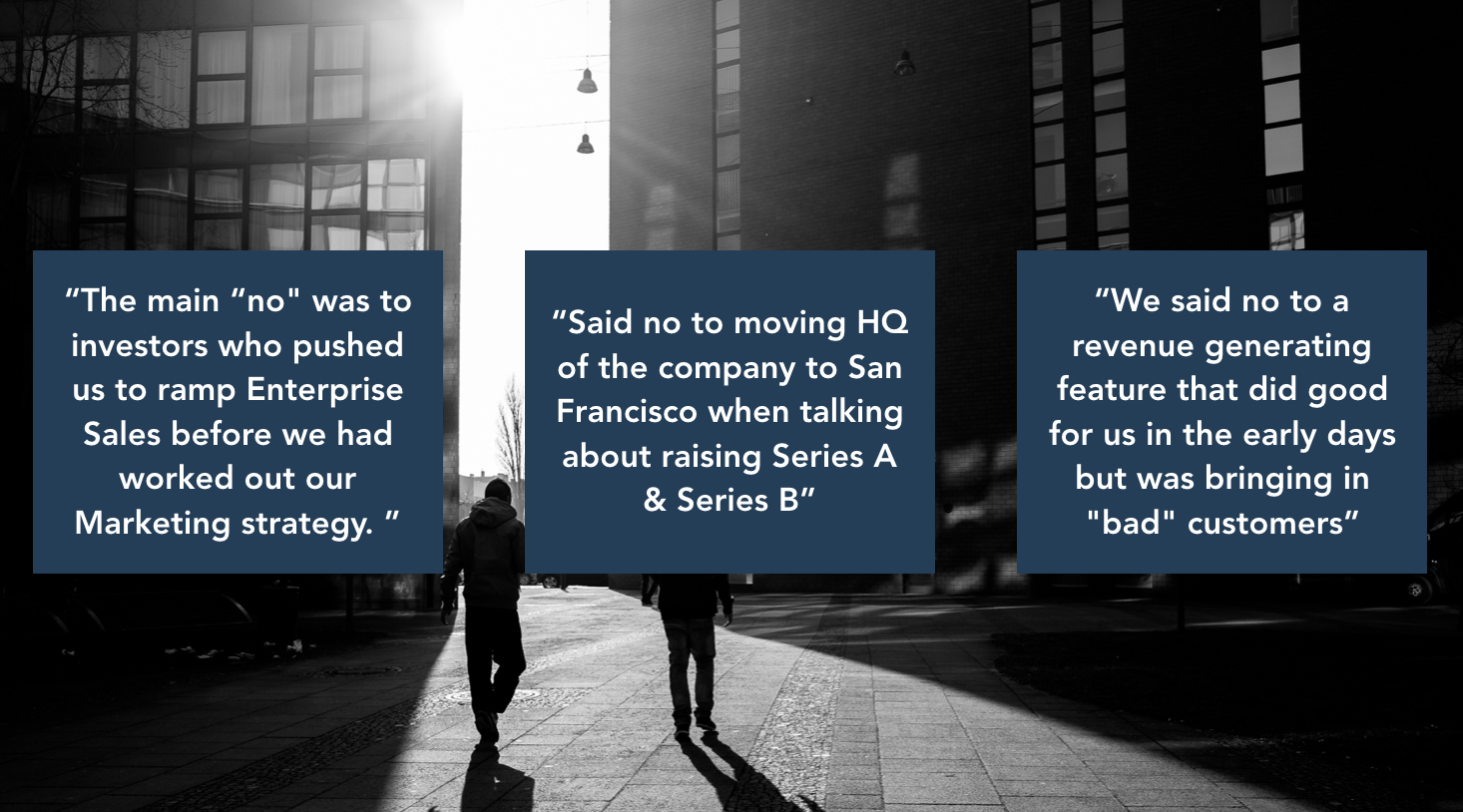 Thanks to Christian Schirrmacher, Flickr
Thanks to Christian Schirrmacher, Flickr
Personally, I’ve always been very customer and product focussed; as a founder you have to learn everything about your market, how to sell, what to build, how to make your customers successful but it took me some time to trust my instinct when more qualified people had a different of opinion to the one I had expressed.
By staying close to every area as you gain traction and scale, you get a completely unique perspective which can clash and be at odds with the culture of the industry or the beliefs of your investors and advisors and other founders have had this experience too.
As I touched on right at the start of the presentation, it really does take some conviction and confidence to say “no” to things and on the scene here we have some great examples from founders who have done things to forge their own path.
This doesn’t mean that you don’t seek the opinions of others, but simply that you should feel comfortable with the decisions that you make.
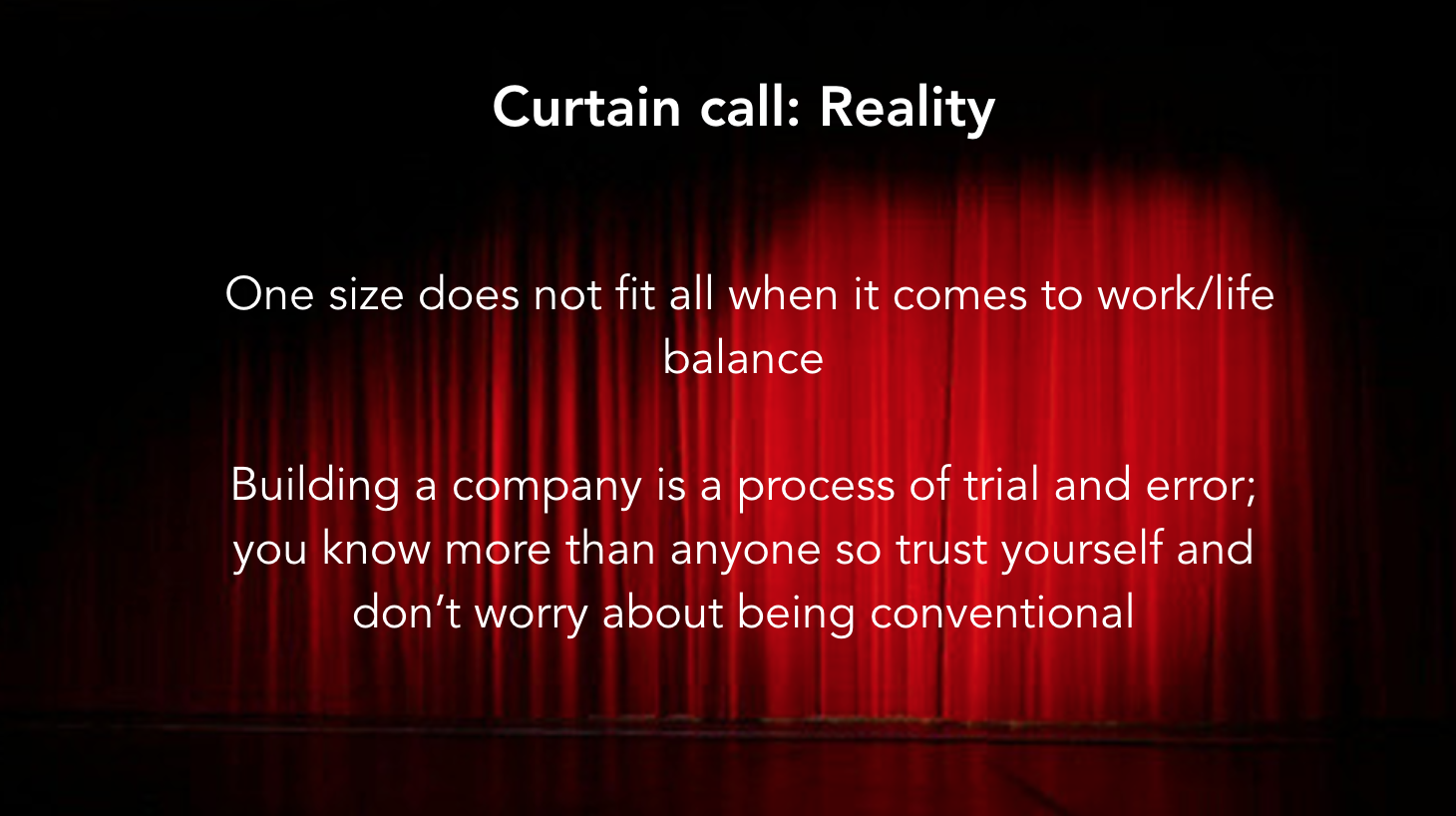 So when it comes to reality — one size really does not fit all when it comes to work/life balance and remember that how you work might not be the right approach for the people on your team.
So when it comes to reality — one size really does not fit all when it comes to work/life balance and remember that how you work might not be the right approach for the people on your team.
And just trust yourself. Forget what is conventional; it’s boring anyway…!
 Thanks to Flickr
Thanks to Flickr
After all of this I’m sure you’re wondering what you can say yes to as you start and grow your company. Founders say no to investors, customers, staff, networking events, speaking engagements, features in their product, headquarters in San Francisco and often their own free time too.
What the heck can you say “yes” to? Well, quite a few things actually…
And obviously, it’s usually the opposite of the “no”… Thanks to CGP Grey, Rob Smits, James Cridland, Robert Cooke and Curran Kelleher — Flickr
Say “yes” to money when the time & people are right for you — whatever form that cash may come in.
Say “yes” to speaking engagements that you know will help others or that fit with your objectives for you and your business.
Say “yes” to trial & error — no-one knows what they are doing. Great founders recognise that you don’t have all the answers. Great founders have a strong strategy, they experiment and they empower their teams by asking questions rather than giving all the answers all of the time.
And do “yes” to being comfortable with the uncomfortable. I’m sure you will have noticed from all the quotes that nothing is easy — you have to get good at being OK with very uncomfortable things. And it’s the times when you are at the furthest out of your comfort zone that you are growing as a founder and bringing new skills back into your organization.
This is by no means a definitive list but I hope sharing these founder tales of the no gives you some food for thought.
I’d like to finish with a couple of final points…
 Thanks to Anne Arnould, Flickr
Thanks to Anne Arnould, Flickr
Just remember that in a lot of cases saying “no” today isn’t a “no” forever — sometimes you have to go for the lowest hanging fruit or hold off on things you COULD do for things you NEED to do.
 Thanks to John Bonham, Flickr
Thanks to John Bonham, Flickr
And these smaller take-aways all carry to the same theme — don’t listen to advice from others, trust your instinct and be focussed.
Anyone can give advice but like all the founders, you need to find your own path and that’s what really came through from the all people I spoke with.
One founder quote really summed up the sentiment of all this for me:
“The difficulty in saying no to almost everything is that it assumes that you know what you are doing. It’s hard to know what to focus on. But once it’s clear what to focus on — it’s magic.”
I couldn’t agree more.
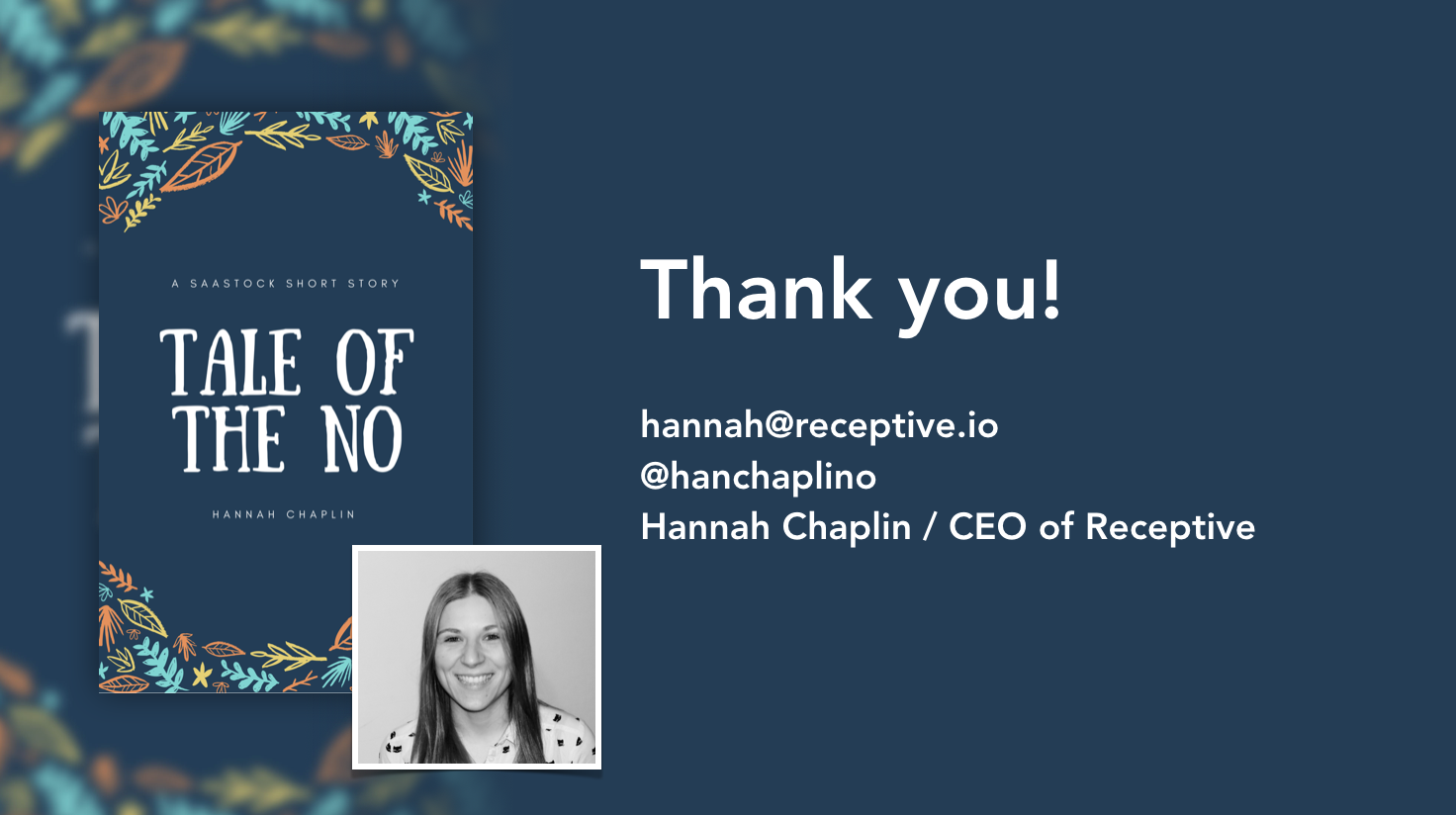 Thanks to Carrie at Receptive
Thanks to Carrie at Receptive
Thank you so much and I hope you’ve enjoyed this presentation feel free to drop me and email on hannah@receptive.io, or grab me on Twitter.
New webinar: How to really use SaaS product feedback at scale with Receptive
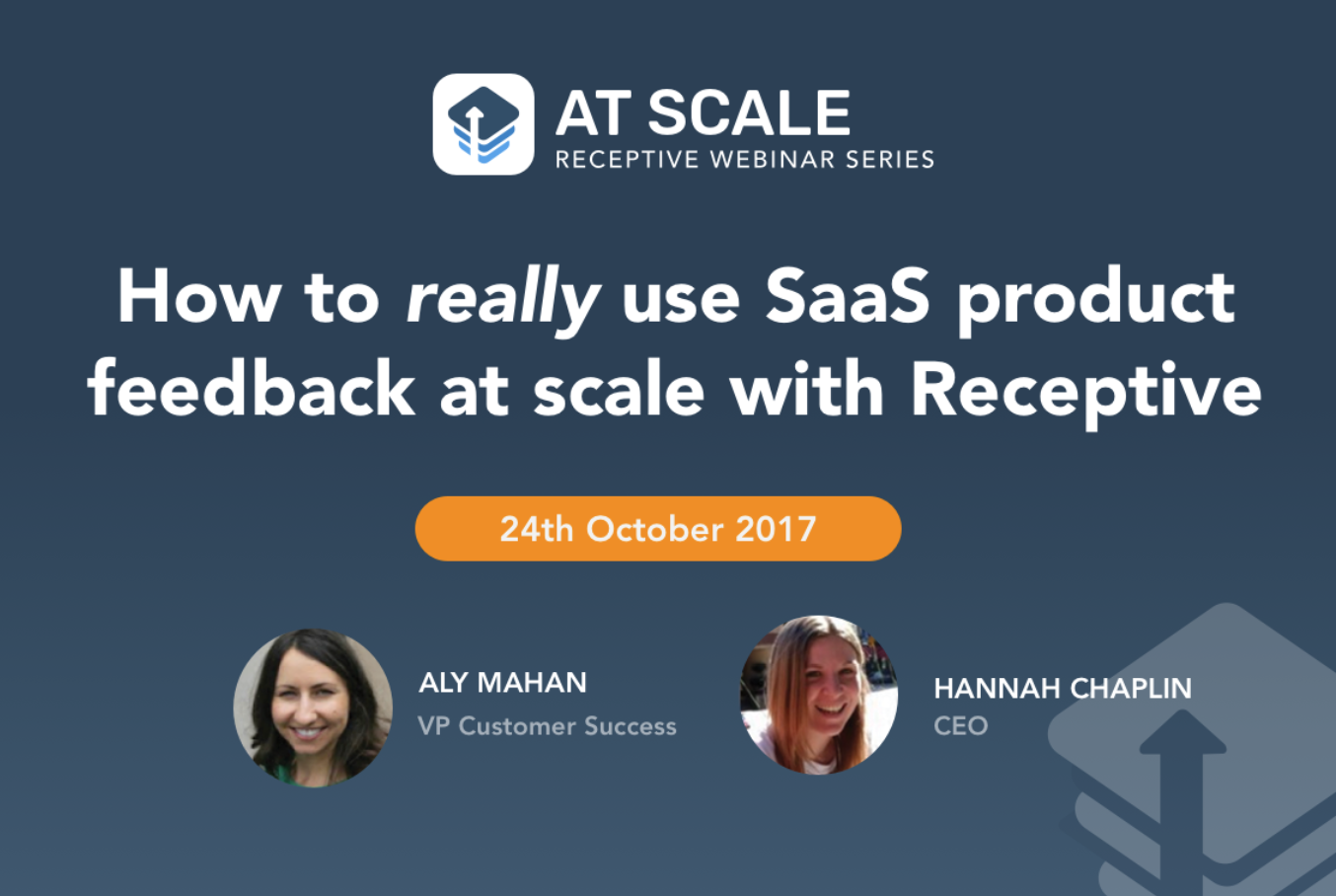 Sign-up to our latest webinar where you’ll learn the theory behind Product Demand Intelligence and see Receptive in action. Full of case studies and practical insights you can start to use
immediately.
Sign-up to our latest webinar where you’ll learn the theory behind Product Demand Intelligence and see Receptive in action. Full of case studies and practical insights you can start to use
immediately.
About the At Scale series
Over the last few years, we’ve worked with hundreds of SaaS companies and one huge learning has been how the approach to product feedback has to change as a business scales.
When you are just starting out and have a small team and a few customers, gathering feedback, feature requests and ideas is a key activity but it can easily be done using inexpensive methods like a simple spreadsheet or Trello.
As you scale, the simple task of collating and understanding product feedback morphs to become an unwieldy and unmanageable beast which wastes time and energy across all of your teams.
That’s why you need a whole new approach as you grow. This At Scale series explores fundamental concepts around Product Demand Intelligence which will leave you with actionable take-aways and the ability to use feedback to power the growth of your organization. Some topics we will cover:
- Product strategy
- Prioritization
- Segmentation
- Automation
- Customer-success / product management

